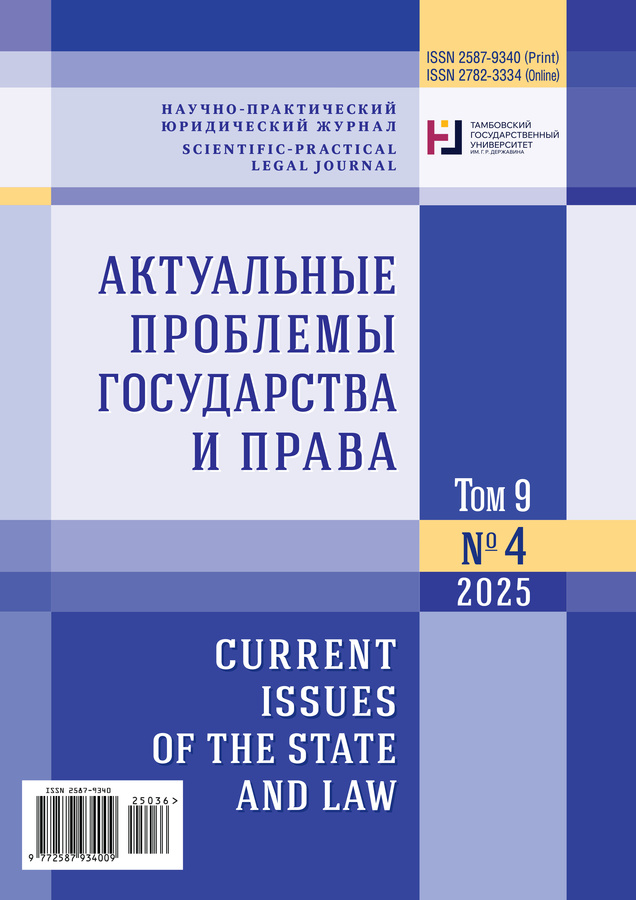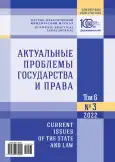Причинная связь и иные каузальные зависимости в неосторожных преступлениях
- Авторы: ВЕРИНА Г.В.1
-
Учреждения:
- ФГБОУ ВО «Саратовская государственная юридическая академия»
- Выпуск: Том 6, № 3 (2022)
- Страницы: 322-330
- Раздел: Материальное право
- URL: https://journal-vniispk.ru/2587-9340/article/view/303781
- ID: 303781
Цитировать
Аннотация
Введение: в современных реалиях уголовно-правовая концепция необходимой причинности перестает быть универсальной, что вызывает серьезную обеспокоенность ученых и инициирует когнитивные процессы в данном правовом пространстве. Поднимаемая совокупность научно-прикладных вопросов, обусловленных, в том числе, бурным развитием цифровизации и искусственного интеллекта, внедрением во все сферы жизни новых технологий, аккумулирует важнейшую теоретико-прикладную проблему причинно-следственной связи и иных каузальных зависимостей между общественно опасным деянием и общественно опасным последствием. Данная проблема согласно научной гипотезе, a priori, наиболее ярко высвечивается в правовом поле неосторожных преступлений. Цель исследования заключается в поиске аргументов состоятельности и правдивости выдвинутой научной гипотезы, критерием истинности которой может служить судебная практика, а также в выявлении особенностей причинной связи в неосторожных преступлениях. С точки зрения методологической основы исследование опирается на всеобщий философский метод познания уголовно-правовой материи, а также ряд общенаучных и частно-научных методов, среди которых анализ и синтез, индукция и дедукция, контент-анализ, герменевтический и догматический методы и др. Результаты исследования и выводы: прежде всего, доказана состоятельность выдвинутой научной гипотезы. Причинно-следственная связь между общественно опасным деянием и общественно опасным последствием в неосторожных преступлениях исследуемой типовой принадлежности (против безопасности движения и эксплуатации транспорта, а также против жизни и здоровья личности) может быть объяснена с учетом комплексного концептуального подхода, синтезирующего рациональные «зерна» теорий необходимой и привходящей причинности (последняя – частное проявление теории “conditio sine qua non”). Особенностью причиняемого вреда в неосторожных преступлениях исследуемого типа выступает его опосредованный характер, обусловленный нюансами объективной обстановки, развития явлений и событий объективного мира, физическими законами, поведением потерпевшего, его физиологическим состоянием, действием механизмов, «поведением» искусственного интеллекта и т. д. Важно также констатировать, что в контексте представленных неосторожных преступлений правильнее вести речь не о причинно-следственной связи, а об иных каузальных зависимостях.
Об авторах
Галина Владимировна ВЕРИНА
ФГБОУ ВО «Саратовская государственная юридическая академия»
Автор, ответственный за переписку.
Email: GV.Verina@yandex.ru
ORCID iD: 0000-0002-3808-740X
SPIN-код: 5559-5097
доктор юридических наук, доцент, профессор кафедры уголовного и уголовно-исполнительного права
Россия, Российская Федерация, 410056 г. Саратов, ул. Вольская, 1Список литературы
- Пионтковский А.А. Учение о преступлении по советскому уголовному праву. Курс советского уголовного права: общая часть. М.: Госюриздат, 1961. 667 с.
- Курс советского уголовного права: в 5 т. / под ред. Н.А. Беляева, М.Д. Шаргородского. Л.: Изд-во Ленинград. ун-та, 1968. Т. 1. Часть общая. 347 с.
- Церетели Т.В. Причинная связь в уголовном праве. М.: Госюриздат, 1963. 383 с.
- Малинин В.Б. Причинная связь в уголовном праве: вопросы теории и практики: автореф. … дис. д-ра юрид. наук. СПб., 1999. 43 с.
- Есаков Г.А. Причинная связь в сложных ситуациях: уголовно-правовая наука и судебная практика // Право. Журнал Высшей школы экономики. 2016. № 1. С. 81-102. doi: 10.17323/2072-8166.2016.1.81.102
- Лобанова Л.В., Ларионова Л.Н. Альтернативность причинной связи как признака состава преступления // Вестник Волгоградского государственного университета. Серия 7: Философия. Социология и социальные технологии. 2016. № 3 (33). С. 46-55. doi: 10.15688/jvolsu7.2016.3.6
- Соктоев З.Б. Причинность в уголовном праве: теоретические и прикладные проблемы: дис. … д-ра юрид. наук. М., 2014. 408 с.
- Хрусталева Ю.А. Причинно-следственные связи в судебной медицине: содержание, способы выявления и значение при механической травме: дис. … д-ра мед. наук. СПб., 2018. 392 с.
- Блинов А.Г. Уголовно-правовая охрана личности в эпоху цифровизации и искусственного интеллекта // Уголовный закон в эпоху искусственного интеллекта и цифровизации: сб. тр. по материалам Всерос. науч.-практ. конф. с междунар. участием в рамках 1 Сарат. междунар. юрид. форума, посвящ. 90-летнему юбилею Сарат. гос. юрид. акад. / под общ. ред. А.Г. Блинова, Е.В. Кобзевой. Саратов: Изд-во Сарат. гос. юрид. акад., 2021. С. 42-50.
Дополнительные файлы









